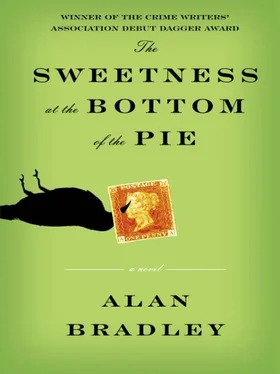Alan Bradley - The Sweetness at the Bottom of the Pie
Здесь есть возможность читать онлайн «Alan Bradley - The Sweetness at the Bottom of the Pie» весь текст электронной книги совершенно бесплатно (целиком полную версию без сокращений). В некоторых случаях можно слушать аудио, скачать через торрент в формате fb2 и присутствует краткое содержание. Жанр: Старинная литература, на английском языке. Описание произведения, (предисловие) а так же отзывы посетителей доступны на портале библиотеки ЛибКат.
- Название:The Sweetness at the Bottom of the Pie
- Автор:
- Жанр:
- Год:неизвестен
- ISBN:нет данных
- Рейтинг книги:3 / 5. Голосов: 1
-
Избранное:Добавить в избранное
- Отзывы:
-
Ваша оценка:
- 60
- 1
- 2
- 3
- 4
- 5
The Sweetness at the Bottom of the Pie: краткое содержание, описание и аннотация
Предлагаем к чтению аннотацию, описание, краткое содержание или предисловие (зависит от того, что написал сам автор книги «The Sweetness at the Bottom of the Pie»). Если вы не нашли необходимую информацию о книге — напишите в комментариях, мы постараемся отыскать её.
The Sweetness at the Bottom of the Pie — читать онлайн бесплатно полную книгу (весь текст) целиком
Ниже представлен текст книги, разбитый по страницам. Система сохранения места последней прочитанной страницы, позволяет с удобством читать онлайн бесплатно книгу «The Sweetness at the Bottom of the Pie», без необходимости каждый раз заново искать на чём Вы остановились. Поставьте закладку, и сможете в любой момент перейти на страницу, на которой закончили чтение.
Интервал:
Закладка:
The island, the lake, and the Folly had been designed by Capability Brown (although this attribution had been brought into question more than once in the pages of Notes and Queries , which Father read avidly, but only in case matters of philatelic interest should crop up), and there was still in the library at Buckshaw a large red leather portfolio containing a signed set of the landscaper's original drawings. These inspired a little witticism on Father's part: “Let those other wise men live in their own folly,” he said.
There was a family tradition that it had been on a picnic at Buckshaw Folly that John Montague, the fourth Earl of Sandwich, invented the snack which was given his name when he first slapped cold grouse between two slices of bread while playing at cribbage with Cornelius de Luce.
"History be damned," Father had said.
Now, having waded out to the island through water no more than a foot deep, I sat on the steps of the little temple with my legs drawn up and my chin on my knees.
First of all, there was Mrs. Mullet's custard pie. Where had it gone?
I let my mind drift back to the early hours of Saturday morning: envisioned myself coming down the stairs, going through the hallway to the kitchen, and—yes, the pie had certainly been on the windowsill. And there had been a single piece cut out of it.
Later, Mrs. Mullet had asked if I enjoyed the pie. Why me? I wondered. Why didn't she ask Feely or Daffy?
And then it struck me like a thunderclap! The dead man had eaten it. Yes. Everything was making sense!
Here was a diabetic who had come on a long journey from Norway, bringing with him a jack snipe concealed in a pie. I had found the remains of that pie—complete with telltale feather—at the Thirteen Drakes, and the dead bird had been dumped on our doorstep. Not having eaten—even though, according to Tully Stoker, he had been served a drink in the saloon bar—the stranger had made his way to Buckshaw on Friday night, quarreled with Father, and on his way out passed through the kitchen and helped himself to a slice of Mrs. Mullet's custard pie. And he hadn't made it through the cucumbers before it brought him down!
What kind of poison could work that quickly? I ran through the most likely possibilities. Cyanide worked in minutes: after turning blue in the face, the victim was asphyxiated almost immediately. It left behind a smell of bitter almonds. But no, the case against cyanide was that, had it been used, the victim would have been dead before I found him. (Although I have to admit that I have a soft spot for cyanide—when it comes to speed, it is right up there with the best of them. If poisons were ponies, I'd put my money on cyanide.)
But was it bitter almonds I had smelt on his last breath? I couldn't think.
Then there was curare. It, too, had an almost instant effect and again, the victim died within minutes by asphyxiation. But curare could not kill by ingestion; to be fatal, it had to be injected. Besides that, who in the English countryside—besides me, of course—would be likely to carry curare in his kit?
What about tobacco? I recalled that a handful of tobacco leaves left to soak in a jar of water in the sun for several days could easily be evaporated to a thick black molasses-like resin which brought death in seconds. But Nicoteana was grown in America, its fresh leaves unlikely to be found in England, or, for that matter, in Norway.

Query: would crumbled cigarette ends, cigars, or pipe tobacco produce an equally toxic poison?
Since nobody smoked at Buckshaw, I would have to gather my own samples.

Query: when (and where) are the ashtray emptied at the Thirteen Drakes?
THE REAL QUESTION WAS THIS: Who put the poison in the pie? And, even more to the point, if the dead man had eaten the thing by accident, whom had it originally been intended for?
I shivered as a shadow passed across the island, and I looked up just as a darkening cloud blotted out the sun. It was going to rain—and soon.
But before I could scramble to my feet it came pouring down in buckets, one of those sudden brief but ferocious storms of early June that smashes flowers and plays havoc with drains. I tried to find a dry, sheltered spot in the precise center of the open cupola where I would be most sheltered from the pelting rain—not that it made much difference, what with the cold wind that had suddenly sprung up out of nowhere. I wrapped my arms round myself for warmth. I'd have to wait it out, I thought.
"Hullo! Are you all right?"
A man was standing at the far edge of the lake, looking across at me on the island. Through the sheets of falling rain, I could see no more than dabs of damp color, which gave him the appearance of someone in an Impressionist painting. But before I could reply, he had rolled up his trouser legs and removed his shoes, and was swiftly wading barefoot towards me. As he steadied himself with his long walking staff, he reminded me of Saint Christopher carrying the Christ Child piggyback across the river, although as he drew closer, I could see that the object on his shoulders was actually a canvas knapsack.
He was dressed in a baggy walking suit and wore a hat with a wide, floppy brim: a bit like Leslie Howard, the film star, I thought. He was fiftyish, I guessed, about Father's age but dapper in spite of it.
With a waterproof artist's sketchbook in one hand, he was the very image of the strolling artist-illustrator: Olde England, and all that.
"Are you all right?" he repeated, and I realized I hadn't answered him the first time.
"Perfectly well, thank you," I said, babbling a bit too much to make up for my possible rudeness. "I was caught in the rain, you see."
"I do see," he said. "You're saturated."
"Not so much saturated as drenched," I corrected him. When it came to chemistry, I was a stickler.
He opened his knapsack and pulled out a waterproof walking cape, the sort of thing worn by hikers in the Hebrides. He wrapped it round my shoulders and I was immediately warm.
"You needn't. but thank you," I said.
We stood there together in the falling rain, not speaking, each of us gazing off across the lake, listening to the clatter of the downpour.
After a time he said, “Since we're to be marooned on an island together, I suppose there could be no harm in us exchanging names.”
I tried to place his accent: Oxford with a touch of something else. Scandinavian, perhaps?
"I'm Flavia," I said. "Flavia de Luce."
"My name's Pemberton, Frank Pemberton. Pleased to meet you, Flavia."
Pemberton? Wasn't this the man who had arrived at the Thirteen Drakes just as I was making my escape from Tully Stoker? I wanted that visit kept quiet, so I said nothing.
We exchanged a soggy handshake, and then drew apart as strangers often do after they've touched.
The rain went on. After a bit he said, “Actually, I knew who you were.”
"Did you?"
"Mmm. To anyone who takes a serious interest in English country houses, de Luce is quite a well-known name. Your family is, after all, listed in Who's Who. "
"Do you take a serious interest in English country houses, Mr. Pemberton?”
He laughed. “A professional interest, I'm afraid. In fact I'm writing a book on the subject. I thought I would call it Pemberton's Stately Homes: A Stroll Through Time . Has rather an impressive ring, don't you think?”
"I expect it depends upon whom you're trying to impress," I said, "but it does, yes. rather, I mean."
Читать дальшеИнтервал:
Закладка:
Похожие книги на «The Sweetness at the Bottom of the Pie»
Представляем Вашему вниманию похожие книги на «The Sweetness at the Bottom of the Pie» списком для выбора. Мы отобрали схожую по названию и смыслу литературу в надежде предоставить читателям больше вариантов отыскать новые, интересные, ещё непрочитанные произведения.
Обсуждение, отзывы о книге «The Sweetness at the Bottom of the Pie» и просто собственные мнения читателей. Оставьте ваши комментарии, напишите, что Вы думаете о произведении, его смысле или главных героях. Укажите что конкретно понравилось, а что нет, и почему Вы так считаете.












